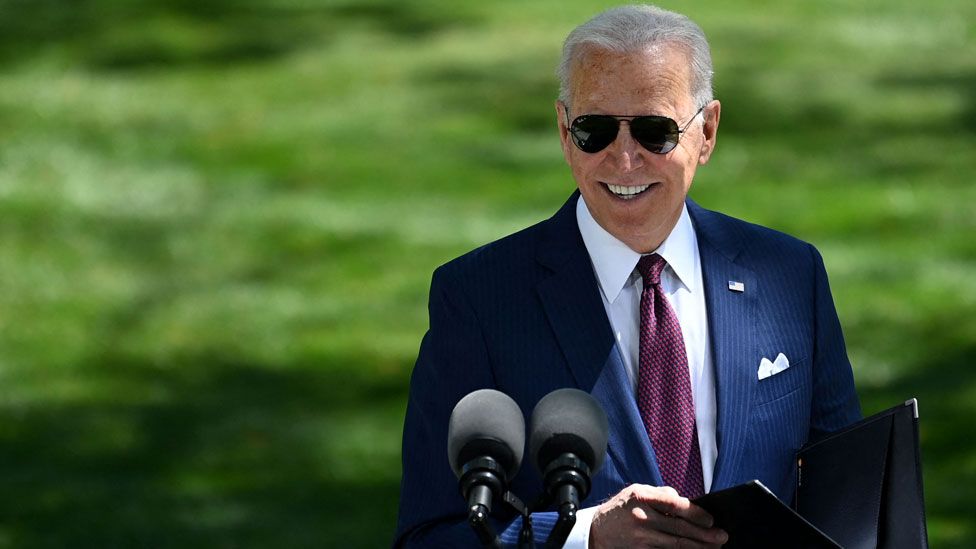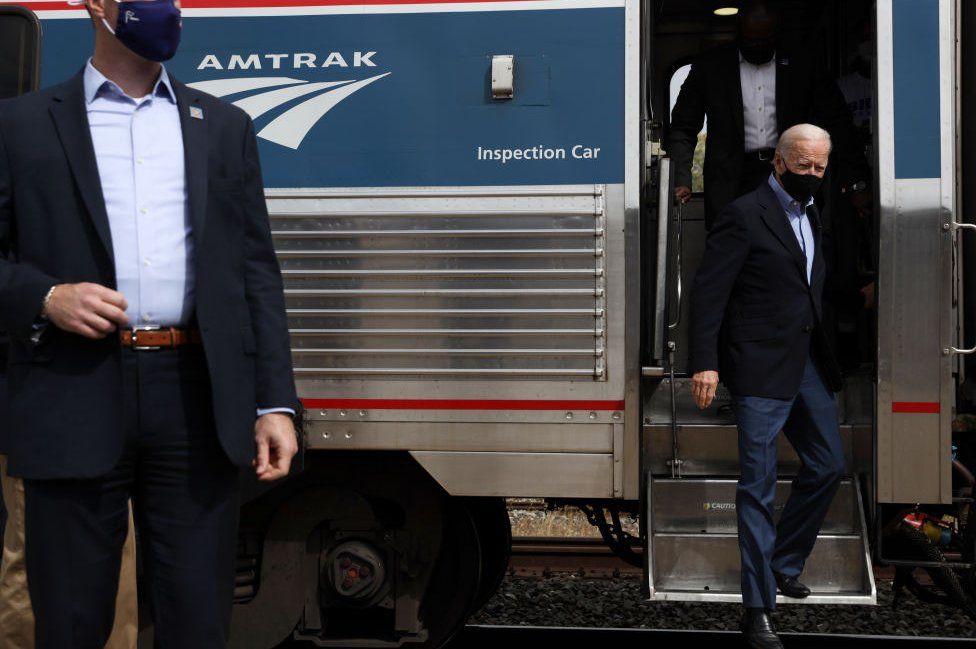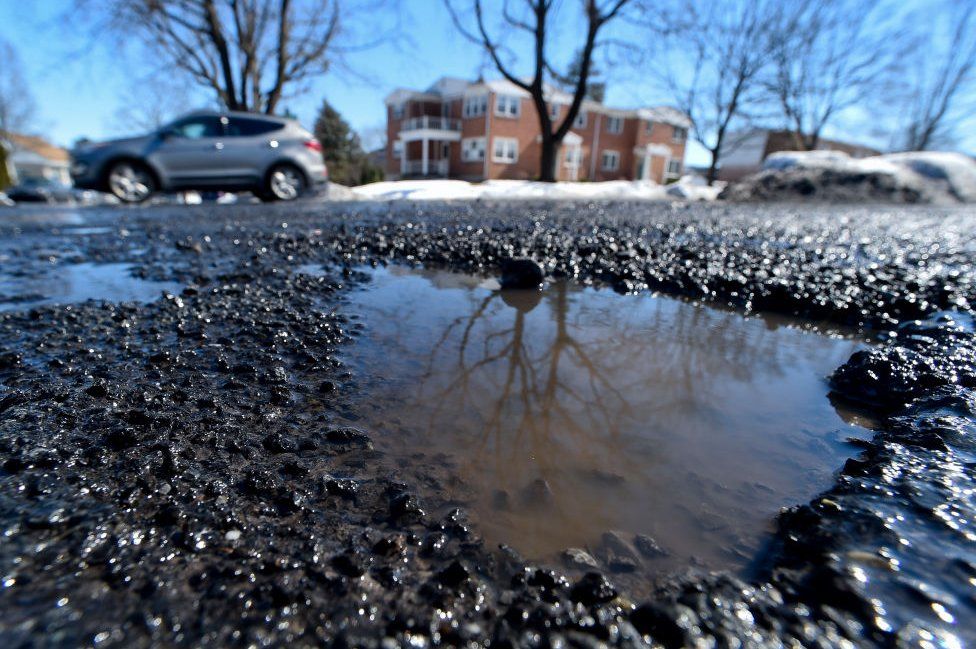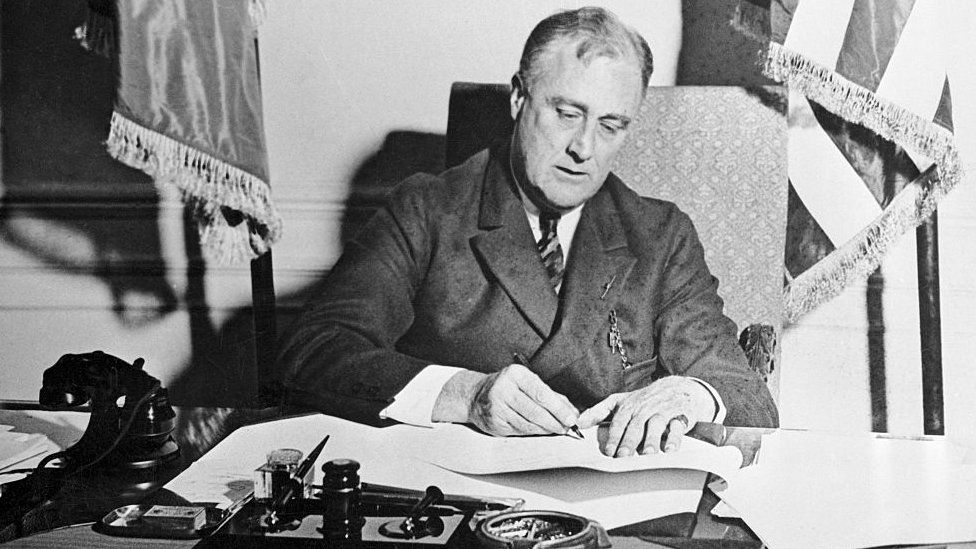
For the White House press corps who've binged out for four years on the son et lumière of the Trump-show, the last three months have been a challenge.
As I remarked, perhaps unwisely, to an audience the other night, the transition from Trump to Joe Biden has been like going from a daily crack pipe to a small bottle of low-alcohol beer once a week.
The daily White House briefings now are a snoozefest. There are no fights, no name-calling.
No middle-of-the-night Twitter storms, no payments to porn stars, no rollicking MAGA rallies.
So does all this mean it's been a boring presidency? Absolutely not. This is a far more interesting presidency - so far - than I think any of us had imagined. I would go as far as to say it's fascinating.
The sad thing, from a purely selfish point of view, is that what it isn't is a made-for-TV spectacular, which is what I have feasted on these past four years.
Donald Trump always had an eye for the visual and outrageous. He knew how to make himself the centre of attention; Biden seems to relish the lack of histrionics, and seems to think it is important for people to focus on what he delivers, rather than what he says. Most strange.
We reported that Joe Biden - all 78 years of him - would be a transitional president. He would be there to lower the political temperature; try to heal a divided nation.
Take the absurd politics out of the response to Covid. Improve vaccine roll-out. Drain the poison from the body politic. But that aside, not do too much.
He appointed a largely technocratic cabinet, presumably to perform managerial functions. Maybe make the trains run on time a bit better, but not change all the rolling stock, let alone alter the gauge of the railway. A fitting ambition for Amtrak Joe.

But maybe we've got that all wrong. Is it possible that far from being transitional, he's transformational?
And that word is not freighted with a positive or negative connotation - it is merely a statement based on the ambition of what we've seen so far. Voters will soon decide whether it's for better or worse.
Let's start with the $1.9 trillion (£1.35tn) stimulus package.
The headline from the passing of this humungous piece of legislation was that nearly all adult Americans would receive a cheque for $1,400 to help them cope with the hardships brought about by the pandemic. It was cash in hand to a lot of Americans, and won massive approval - from Democratic and Republican voters alike - although not a single Republican lawmaker would back the proposal.
But look beyond the headline and lift the lid on this policy a little further. There is a lot to see. Perhaps most significant is the extension of child tax credits. Poorer families could soon be receiving up to $3,000 per child per annum. It is estimated this one measure will lift literally millions of youngsters out of poverty. As things stand, this measure is for 2021 only - but it is clear within the White House that Joe Biden wants to make this permanent.
It is a major piece of social policy. It is big potatoes.
With the passing of the stimulus package - or the American Rescue Package, as it is more properly called - Biden wanted to correct something he felt that Barack Obama had got wrong when he came to power and inherited the mess of the financial crisis in 2009. Yes, Obama passed a variety of measures - but with hindsight they were seen as too cautious; not ambitious enough.
One insight that Biden has borrowed from his time as vice-president to America's first African-American president, is do not let a good crisis go to waste. The urgency of the pandemic has given Biden the excuse he needed to push for a massive plan. And he got it through.
Now look at what he's planning on rebuilding America's infrastructure. Again, the price tag will be in the trillions. Again, the ambition will be immense - not just the staid repairing of bridges and roads (important and vital though that is); it is about making digital access more equitable - but it goes wider than that. Way wider.
"It is not a plan that tinkers around the edges," the president told an audience outside Pittsburgh. "It is a once-in-a-generation investment in America."
For Republicans it's typical government overreach and smacks more of social engineering than the civic kind usually associated with highway repairs.

The wish-list of what Biden hopes to achieve from this infrastructure plan goes on and on. It aspires to create millions of jobs in the short term and strengthen American competitiveness in the long. It hopes to lead to greater racial equality. The focus on new, cleaner energy sources promises to help the nation fight climate change.
On the subject of which, look too at the ambitious goals he's set for climate change with the virtual summit he held last week in Washington. These are not the actions of a steady-as-you-go president. A 52% cut in emissions by the end of the decade is BIG.
Who knows whether he'll achieve it - it's going to require Americans to change the way they drive; the way they heat and cool their homes. The way industry functions. But if the ambition is to show American ambition, it is, umm, ambitious.
Now obviously there is an element of motherhood and apple pie in this shopping list. And the measure needs to pass through Congress, and that hasn't happened.
And whilst I am in the business of saying "and", let me add this…. and there is something slightly ridiculous on the focus of the first 100 days.
The first 100 days is a statement of intent, a down payment on what you might do with the rest of your term. But frankly, who cares if you have a sparkling first 100 days if the subsequent 1,360 stink and sink?
All that said, the statement of intent is big, and this is what makes boring old Joe Biden so interesting.
This is a blog column and not a book, but arguably the dominant idea in American politics for the past 40 years has been the low-taxing, economy-deregulating, budget-balancing, competition-encouraging, union-limiting small government of Ronald Reagan.
The same is true of the influence of Thatcherism in the UK - yes, there have been 13 years of Labour government since Maggie's demise, just as here there have been the Clinton and Obama terms since Reagan. But arguably they operated within, and were defined by, the orthodoxy of the monetarist economists who've held such intellectual sway on both sides of the Atlantic: Milton Friedman, the Chicago school, Laffer curves, Sir Alan Walters.

If Obama's rescue package didn't go far enough (as Biden believes), surely that was because he was looking at the disruptive and growing power of the conservative Tea Party movement. Both Clinton and Blair saw their paths to victory through the elusive "third way": free-market economic liberalism with a big dollop of concern for the least well off.
After the morale-sapping defeats of the 1980s- both for Labour in the UK and Democrats in the US - the head-scratching was intense on what they needed to do to win. Both Bill Clinton and Tony Blair came to believe firmly that tax-raising and big government pledges would not reverse that trend.
But Biden - for better or worse - looks like he is using the pandemic and the woeful state of America's infrastructure to unapologetically say to the American people "yep, big government is back". It is territory that Republican opponents - still trying to sort out their post-Trumpian identity - will be keen to fight on.
Joe Biden's former pollster is even more bullish, arguing the president should be more direct about the need to raise taxes on the wealthiest to pay for this ambition.
Make no mistake: this is a big break and a mighty gamble. So far, his approval ratings on the ground where he has chosen to fight - handling of coronavirus, the economic stimulus, his plans for infrastructure - have been really positive.
Less so over the chaos at the southern border; something the president now acknowledges is a crisis. And the perennial issue of gun control is going to lead to a lot of huffing and puffing, but it's hard to see what he will be able to achieve through legislation, given the fine balance of the Senate.
Joe Biden has been a stickler for sticking to social distancing and mask wearing, marking a big distinction with the freewheeling, coronavirus super-spreading White House of his predecessor. Meetings with the president are kept socially distanced; protocols strictly adhered to.
But this time last month an interesting meeting took place in the East Room.

Presidential historian Jon Meacham brought in a number of his eminent colleagues for a sitdown that Joe Biden was anxious to host. At this stage, only around 60 days into his presidency, Biden was already thinking about his legacy and what he needed to do; what was the limit of presidential power; what lessons could he learn from his predecessors.
At one point he turns to - perhaps - the most revered of these presidential scholars, Doris Kearns Goodwin, and says "I'm no FDR, but… "
Perhaps Joe Biden is eyeing this as his moment to deliver a New Deal à la Franklin Delano Roosevelt following the Great Depression, or the war on poverty and fight against racial inequality that was championed in the 1960s by Lyndon B Johnson.
The taunt of Donald Trump during the campaign was that Biden may have been in politics for over four decades, but what did he have to show for it.
It looks like in power he is trying to give a mighty clear answer to that question - even if it doesn't make for great theatre.
"all" - Google News
April 28, 2021 at 04:46AM
https://ift.tt/3eCYEYn
Biden 100 days: What we all got wrong about him - BBC News
"all" - Google News
https://ift.tt/2vcMBhz
Bagikan Berita Ini














0 Response to "Biden 100 days: What we all got wrong about him - BBC News"
Post a Comment